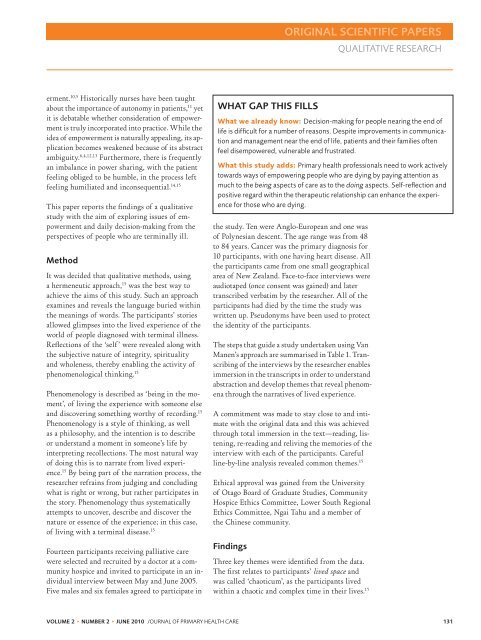entire issue - The Royal New Zealand College of General Practitioners
entire issue - The Royal New Zealand College of General Practitioners
entire issue - The Royal New Zealand College of General Practitioners
You also want an ePaper? Increase the reach of your titles
YUMPU automatically turns print PDFs into web optimized ePapers that Google loves.
ORIGINAL SCIENTIFIC PAPErS<br />
quaLitative research<br />
erment. 10,5 Historically nurses have been taught<br />
about the importance <strong>of</strong> autonomy in patients, 11 yet<br />
it is debatable whether consideration <strong>of</strong> empowerment<br />
is truly incorporated into practice. While the<br />
idea <strong>of</strong> empowerment is naturally appealing, its application<br />
becomes weakened because <strong>of</strong> its abstract<br />
ambiguity. 6,4,12,13 Furthermore, there is frequently<br />
an imbalance in power sharing, with the patient<br />
feeling obliged to be humble, in the process left<br />
feeling humiliated and inconsequential. 14,15<br />
This paper reports the findings <strong>of</strong> a qualitative<br />
study with the aim <strong>of</strong> exploring <strong>issue</strong>s <strong>of</strong> empowerment<br />
and daily decision-making from the<br />
perspectives <strong>of</strong> people who are terminally ill.<br />
Method<br />
It was decided that qualitative methods, using<br />
a hermeneutic approach, 15 was the best way to<br />
achieve the aims <strong>of</strong> this study. Such an approach<br />
examines and reveals the language buried within<br />
the meanings <strong>of</strong> words. <strong>The</strong> participants’ stories<br />
allowed glimpses into the lived experience <strong>of</strong> the<br />
world <strong>of</strong> people diagnosed with terminal illness.<br />
Reflections <strong>of</strong> the ‘self’ were revealed along with<br />
the subjective nature <strong>of</strong> integrity, spirituality<br />
and wholeness, thereby enabling the activity <strong>of</strong><br />
phenomenological thinking. 15<br />
Phenomenology is described as ‘being in the moment’,<br />
<strong>of</strong> living the experience with someone else<br />
and discovering something worthy <strong>of</strong> recording. 15<br />
Phenomenology is a style <strong>of</strong> thinking, as well<br />
as a philosophy, and the intention is to describe<br />
or understand a moment in someone’s life by<br />
interpreting recollections. <strong>The</strong> most natural way<br />
<strong>of</strong> doing this is to narrate from lived experience.<br />
15 By being part <strong>of</strong> the narration process, the<br />
researcher refrains from judging and concluding<br />
what is right or wrong, but rather participates in<br />
the story. Phenomenology thus systematically<br />
attempts to uncover, describe and discover the<br />
nature or essence <strong>of</strong> the experience; in this case,<br />
<strong>of</strong> living with a terminal disease. 15<br />
Fourteen participants receiving palliative care<br />
were selected and recruited by a doctor at a community<br />
hospice and invited to participate in an individual<br />
interview between May and June 2005.<br />
Five males and six females agreed to participate in<br />
What gap this fills<br />
What we already know: Decision-making for people nearing the end <strong>of</strong><br />
life is difficult for a number <strong>of</strong> reasons. Despite improvements in communication<br />
and management near the end <strong>of</strong> life, patients and their families <strong>of</strong>ten<br />
feel disempowered, vulnerable and frustrated.<br />
What this study adds: Primary health pr<strong>of</strong>essionals need to work actively<br />
towards ways <strong>of</strong> empowering people who are dying by paying attention as<br />
much to the being aspects <strong>of</strong> care as to the doing aspects. Self-reflection and<br />
positive regard within the therapeutic relationship can enhance the experience<br />
for those who are dying.<br />
the study. Ten were Anglo-European and one was<br />
<strong>of</strong> Polynesian descent. <strong>The</strong> age range was from 48<br />
to 84 years. Cancer was the primary diagnosis for<br />
10 participants, with one having heart disease. All<br />
the participants came from one small geographical<br />
area <strong>of</strong> <strong>New</strong> <strong>Zealand</strong>. Face-to-face interviews were<br />
audiotaped (once consent was gained) and later<br />
transcribed verbatim by the researcher. All <strong>of</strong> the<br />
participants had died by the time the study was<br />
written up. Pseudonyms have been used to protect<br />
the identity <strong>of</strong> the participants.<br />
<strong>The</strong> steps that guide a study undertaken using Van<br />
Manen’s approach are summarised in Table 1. Transcribing<br />
<strong>of</strong> the interviews by the researcher enables<br />
immersion in the transcripts in order to understand<br />
abstraction and develop themes that reveal phenomena<br />
through the narratives <strong>of</strong> lived experience.<br />
A commitment was made to stay close to and intimate<br />
with the original data and this was achieved<br />
through total immersion in the text—reading, listening,<br />
re-reading and reliving the memories <strong>of</strong> the<br />
interview with each <strong>of</strong> the participants. Careful<br />
line-by-line analysis revealed common themes. 15<br />
Ethical approval was gained from the University<br />
<strong>of</strong> Otago Board <strong>of</strong> Graduate Studies, Community<br />
Hospice Ethics Committee, Lower South Regional<br />
Ethics Committee, Ngai Tahu and a member <strong>of</strong><br />
the Chinese community.<br />
Findings<br />
Three key themes were identified from the data.<br />
<strong>The</strong> first relates to participants’ lived space and<br />
was called ‘chaoticum’, as the participants lived<br />
within a chaotic and complex time in their lives. 15<br />
VOLUME 2 • NUMBER 2 • JUNE 2010 J OURNAL OF PRIMARY HEALTH CARE 131

















